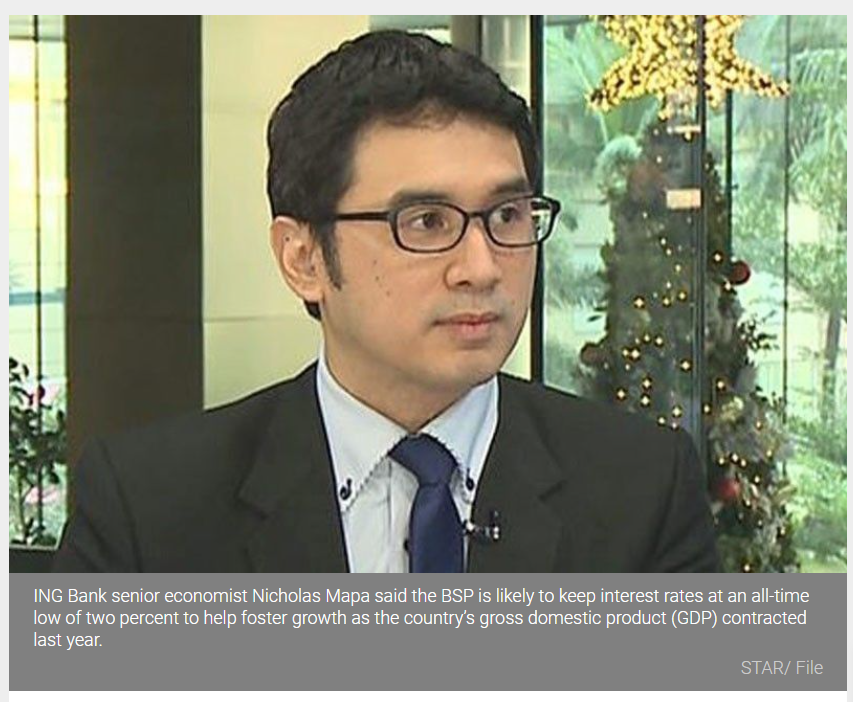Philippines: ‘Negative interest rates to stay until Phl recovers’
MANILA, Philippines — The Bangko Sentral ng Pilipinas (BSP) is seen keeping real interest rates in negative territory to help the country recover from the pandemic-induced economic recession through higher spending, according to economists.
ING Bank senior economist Nicholas Mapa said the BSP is likely to keep interest rates at an all-time low of two percent to help foster growth as the country’s gross domestic product (GDP) contracted last year.
“The BSP will tolerate having deep negative real policy rates for the time being and only reverse until the economy experiences a meaningful recovery,” Mapa said.
The economy stalled as Luzon was placed under enhanced community quarantine in mid-March to slow the spread of COVID-19. As a result the GDP contracted by 10 percent from January to September last year.
To boost market confidence and cushion the impact of the pandemic on the economy, the BSP acted early and aggressively, cutting interest rates to an all-time low of two percent, lowering the reserve requirement, extending a P540 billion provisional advance to the national government, among others.
On the other hand, inflation quickened to 2.6 percent last year from 2.5 percent in 2019 as prices accelerated to a 22-month high of 3.5 percent in December from 3.3 percent in November.
As a result, real interest rates in the country stood in negative territory, prompting banks to lend more money to borrowers to boost economic activity as opposed to keeping their money at the BSP.
However, despite the aggressive easing by the BSP, credit growth slowed down to 1.9 percent in October as the banking industry’s non-performing loan (NPL) ratio hit a seven-year high of 3.69 percent in October 2020 from 3.47 percent in September 2020 due to uncertainties brought about by the COVID-19 pandemic.
Bank of the Philippine Islands lead economist Jun Neri said there is a need for more fiscal stimulus and monetary actions other than policy rate cuts.
“Today’s inflation print shows the November 2020 cut wasn’t prudent. Market participants asking for a rate cut will have to wait until the second half of 2021 for the possibility of reverse repurchase rate reduction,” Neri said via Twitter.
Neri said last month’s inflation was not supply driven as the increase in meat prices was due to a structural issue, while higher oil prices were due to improving global demand prospects.
“This is what we mean by volatility arising from overly aggressive cuts,” Neri said.
The BSP delivered a series of rate cuts, totaling 200 basis points including the surprise 50 basis points in November last year to cushion the impact of the pandemic. This prompted banks to slash the interest on deposits and savings accounts.
For his part, Rizal Commercial Banking Corp. chief economist Michael Ricafort said the net negative interest rates would make any further cut in policy rates more challenging at the moment.
BSP Governor Benjamin Diokno said the recent uptrend in inflation is seen to be largely transitory, reflecting the short-term impact of weather disturbances.
“The overall balance of risks to future inflation continues to lean toward the downside, owing mainly to the continued uncertainty caused by the pandemic on domestic and global economic activity. Nonetheless, upside risks emanate from the possibility of an early roll out of COVID-19 vaccines in the Philippines, which is expected to ease the existing lockdown measures and expand further operating capacity of the economy,” Diokno said.
Source: https://www.philstar.com/business/2021/01/06/2068394/negative-interest-rates-stay-until-phl-recovers


 Thailand
Thailand




